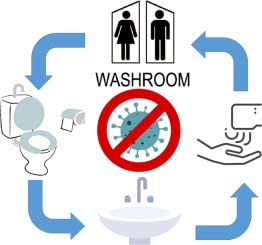A new research study led by a Greek scientist has finally put an end to the age-old argument between men and women around the globe: Toilet seat up? Or down?
It’s official guys. Science says DOWN.
The researchers, led by Australian National University professor of environmental health Sotiris Vardoulakis, analysed 38 studies from 13 countries, published between 2000-2020 to determine the possibility of transmitting viruses and bacteria through public toilets via various routes.
The study headed up by Greek diaspora scientist Dr. Vardoulakis, found no evidence of airborne transmission of C0VID-19 in a public toilet, whilst it calculates the likelihood of being contaminated by the virus as a result of coming into contact with the surfaces in the amenities to be very small, provided that the necessary hygiene measures are observed.
The research, published in the journal Science of Total Environment, studied the possibility of the transmission of viruses and bacteria in public toilets through various routes including air inhalation and touching surfaces.
What the research showed
According to Vardoulakis, "we did not find any evidence of airborne transmission of pathogenic microorganisms, including C0VID-19, in public toilets.
The risk of C0VID-19 getting stuck in a public toilet is small if people have good hand hygiene and the toilet itself is well cleaned.
People are worried about using public toilets during the pandemic, but if one minimises the time spent in them, washes and dries hands regularly, does not use their mobile phone, does not eat or drink in the toilet, then catching the virus constitutes a very small risk."
"Findings from other studies show that airborne transmission is a potential route for C0VID-19 transmission.
"But we found no evidence of this in the public toilets studied during the first year of the pandemic."
There are several reasons why the risk is small: people do not spend much time in the bathroom and do not interact with others.
"More importantly, the aerosols that one inhales when pulling the cistern come from one's own secretions." explains Vardoulakis.
"The risk of infection from the secretions of others is not great, as long as people wash their hands and the bathroom is cleaned and ventilated properly," he added.
AND as long as people put the toilet seat down before flushing.
Our review found no evidence of airborne transmission of #COVID19 in public washrooms. Toilets can become contaminated with viruses and bacteria, but effective hand washing & drying, surface cleaning and ventilation minimise infection risk. Read more: https://t.co/wnyLfdsm3q https://t.co/4VfDQSr0Ay
— Sotiris Vardoulakis (@SotirisVard) September 9, 2021
The study found that hospitals in England, Italy, China and Singapore found traces of coronavirus on toilet surfaces, mainly on their doors, basin lids, sinks and faucets. However Vardoulakis pointed out that "infection is a different test to traces of contamination. “
“Indeed, we have found that surfaces in public toilets can be contaminated with bacteria and viruses. However, if the hygiene of the hands is effectively observed and the toilets are cleaned, the risk is minimised ".
In conclusion…
In conclusion, the new research study confirms that open-lid toilet flushing, ineffective handwashing or hand drying, substandard or infrequent surface cleaning, blocked drains, and uncovered rubbish bins can result in widespread bacterial and/or viral contamination in washrooms.
Although there is a risk of microbial aerosolisation from toilet flushing and the use of hand drying systems, we found no evidence of airborne transmission of enteric or respiratory pathogens, including COVID-19, in public washrooms.
Appropriate hand hygiene, surface cleaning and disinfection, washroom maintenance and ventilation and closing the toilet lid before flushing are likely to minimise the risk of infectious disease transmission.
So if you're not closing the toilet lid, well, you should be. End of discussion!

Doctor Sotiris Vardoulakis studied Physics at the University of Athens (1996), completed postgraduate studies at Imperial College London (Master in Environmental Technology) and at the University of Greenwich where he received his PhD in air quality. He currently teaches environmental health and leads a research team at the National Centre for Epidemiology and Population Health at the Australian National University.
Greek government to fire and fine up to 5,000 euros those faking vaccination certificates



